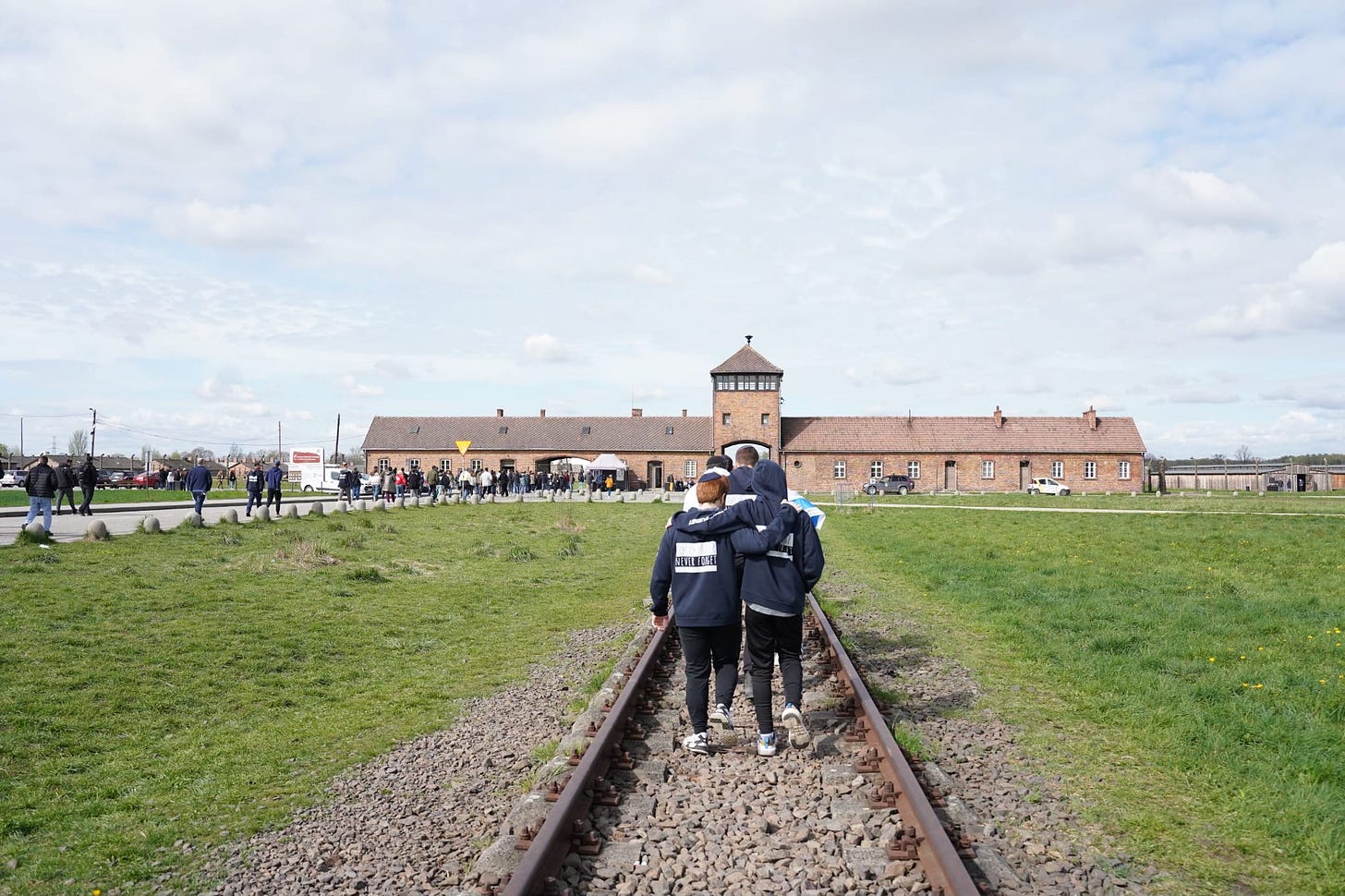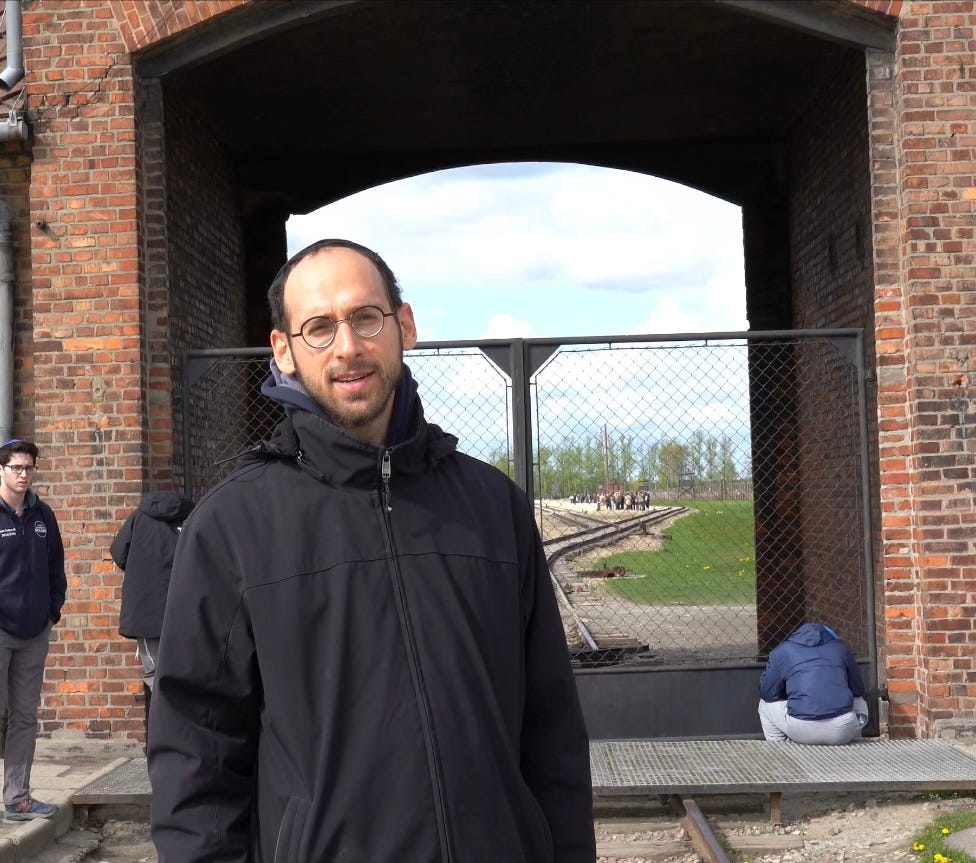Where Was God in the Holocaust (And on October 7)? [Part 1]
We don't know, but we still need to care.

Dear Healthy Jew,
Last week the Jewish people began a 3-week period where we mourn the destruction of Jerusalem and the Temple - and the exiles and persecutions we’ve suffered as a result over the past almost two thousand years.
Given this context and the tragedies that have struck our people in the past 10 months, now is the time to take a close look at the faith crisis many Jews are facing today:
Where was God on October 7, during the Holocaust, and all the other times Jews suffered for no other reason than being Jews?
When we’re confronted with such mind-numbing questions, all the philosophical answers (“God is in the process of revealing His perfect oneness,” “it was atonement to avert an even greater tragedy”) seem woefully inadequate.
Our hearts are so disturbed that our minds are no longer convinced.
What do most good Jews do?
We admit that we don’t know.
God’s justice is perfect and God’s love is unconditional, but we have no clue where his justice and love were hiding during Jewish history’s darkest periods.
I’m not going to challenge that answer, because it’s correct. But it must be qualified and refined.
There are two ways of saying “I don’t know”:
We might drop the question with a shrug of our shoulders because it’s too deep and painful to look at. If we do that, “I don’t know,” quickly turns into “I don’t care,” and life goes on its merry way.
Not knowing can be our answer: a humble and logical response to unspeakable horrors. “I don’t know,” because not understanding God’s ways is part of our journey to God.
Taking the first approach, as we’ll learn, is a terrible mistake, and is exactly what God does not want us to do. The Torah instructs us to wake up to tragedies, not to ignore them and continue along just as before.
Waking up can begin by asking hard questions and honestly expressing our doubts. When facing emotional and physical pain, our path to God might have us crying out, “Where are You?”
By including God in the search for God, our ultimate admission of not knowing won’t come with a careless shoulder shrug. Healthy Jewish not-knowing is a positive thing, a courageous step towards faith in a God that is truly larger than us.
Since biblical times, Jews have asked why bad things happen to good people, and good things to bad people.
Approximately 4% of the Bible explores how and why God’s perfect justice often seems hidden. That’s the subject of the Book of Job, several chapters of Psalms, and a chapter in Habakuk. Numerous other allusions appear throughout the Bible.
Then came deep Talmudic discussions and the prolific writings of Judaism’s greatest thinkers, such as the Rambam (in Part 3 of his Guide) and Ramban (in his commentary of Job).
Our tradition doesn’t offer a single one-size-fits-all solution.
Because of the depth and complexity of these dilemmas, Judaism’s greatest scholars differ on how to interpret the biblical sources. We’re trying to peer at the place where God-thought and man-thought converge.
Job, the book devoted entirely to this problem, is a particularly telling example. If you’ve ever tried reading it, especially in the original Hebrew, it might have seemed like a hopelessly tangled web of passionate arguments for and against Job’s righteousness that is repeated ad nauseam until God suddenly appears to Job “in a storm” and then somehow everything makes sense.1
Because unravelling Job is such difficult work, the classic commentators interpret the book in radically different ways.
In the coming weeks…
I’ll share with you, both in writing and video footage taken in Poland’s concentration camps, a small part of the Rambam’s approach to Job’s dilemma. The Rambam has much more to say, and we won’t even touch the other major tradition on the subject (of the Ramban).
Our goal isn’t to wrap everything up in a tidy little box. On the contrary, I hope we’ll experience how taking hard questions seriously doesn’t require a simple answer that leaves us feeling all warm and fuzzy.
If we’re lucky, perhaps we’ll even taste the sublime knowing of not-knowing God.

Thank you for reading Healthy Jew.
Here are 2 great paths to continue the journey:
Also check out this intro and index to explore hundreds of posts about our 3 Healthy Jew topics: Wellness with Wisdom, Land of Life (Israel), and Sensible Spirituality.
Finally, always feel free to reach out here with any comments, questions, or complaints:
I look forward to hearing from you!
Be well,
Rabbi Shmuel Chaim Naiman
My father once told me a beautiful anecdote he heard from his 12-grade rabbi. Three of the Bible’s books - Psalms, Proverbs, and Job - come with a different code of ta’amim - the signs above and below words that both punctuate and explain the text - than all the rest, and the code to decipher those signs has been lost.
This missing code, taught my father’s rabbi, alludes to the following difficulties in reading these three works:
Psalms’ 150 individual chapters are understandable, but we don’t know how each one leads into the next.
Proverbs’ verses are understandable, but it’s hard to know how the verses connect.
In Job, we’re so lost that we don’t know how the words fit together to form sentences!







Honest question: does Leviticus 26 apply? I really don't know, but I see it as a possibility.
This is enlightening! I have these questions of God often. It is very uncomfortable for me to ask but I do. I look forward to your future writings.